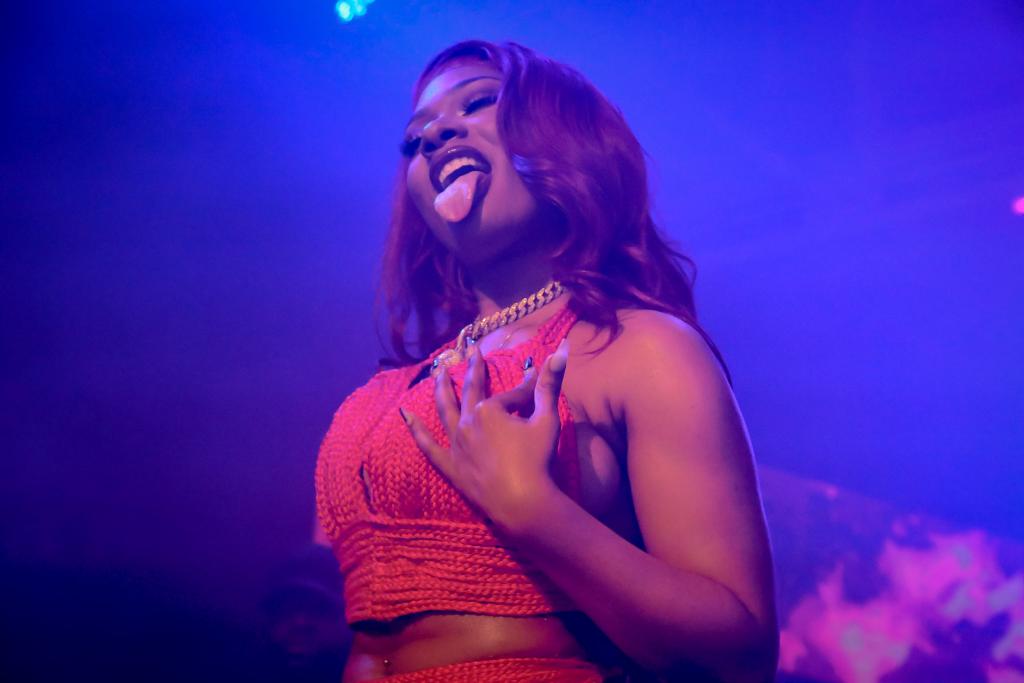
Source: Kevin Rawls / Radio One Digital
To be a woman in hip-hop at this moment feels like a fever pitch — a moment to finally build a world where collaboration, sisterhood and raw talent are at the forefront again. But in her newest cover story for The Fader, Megan Thee Stallion says that if she was “out there making little noises like Uzi and Carti be making, [listeners] would not rock with that. And not saying that they don’t be going hard..but if it was a chick, like no.”
Ivie Ani, music editor of Okayplayer—along with Scottie Beam, podcast host, and Marjua Estevez, digital features editor at BET—sat down in March to discuss the reality of the double standard that exists for Black women in hip-hop. The truths of the limits of representation were clear as the group of journalists and personalities spoke on how the industry is actively trying to minimize the work of this new era being pushed by Black women in hip-hop. “Women are not allowed the luxury to be wack,” says Ani regarding Megan’s lyrical ability and the double standard she faces. “It’s the same dynamic with race, you have to be twice as good to get half as much as a Black person same as a woman.”
The question is: where did this “double standard” come from, and why is an issue that has inhibited the careers of icons as such Lil Kim, Queen Latifah, and Missy Elliott still prevalent today?
The concept of “working twice as hard and getting half of the reward” is rooted in the idea that Black folks have to outwork racism in order to succeed, and this same idea is what propels many Black women in rap to have to try to outwork not only racism, but also misogyny and femmephobia.
“The suppression of Black women’s voice by dominant groups, Black women’s struggles to work within the confines of norms of racial solidarity, and the seeming protections offered by a culture of dissemblance-influences yet another factor of shaping patterns in silence,” Patricia Hill Collins, scholar and lead academic on Black feminism, says in her book titled Black Feminist Thought.
In a brief dialogue about Megan’s quote, OG x TP and Kei and Meezy of 21 Savage’s management team all weighed in the validity of Megan’s statements on Twitter.
The conversation lead to a back and forth about the music industry’s focus on sexualized rappers and how we ignore folks who have talent but aren’t allowed to experiment with varying flows like Lil Uzi Vert and Playboi Carti. A common name brought up in this conversation is Young MA, a Brooklyn rapper whose fame has centrally been focused on her bars and skill. There has never been a question of Young MA’s ability and skill, yet she is frequently left out of certain rap conversations because of her sexuality.
“African Americans have tried to ignore homosexuality generally and have avoided serious analysis of homophobia within African American communities,” says Collins on the ways that homophobia has left folks out of many conversations. The same is true for the hip-hop industry — while progress is being made for all women in rap, Black women who are queer or gay are often left out of conversations and have more hoops to jump through to be given the respect they deserve.
It must also be made clear that Megan Thee Stallon and Young MA have had some of the strongest LA Leakers freestyles to drop in some time.
Artists like Megan the Stallion, Young MA, Tierra Whack, and Noname are all dynamic rappers who have brought back the importance of freestyling to an industry that has moved toward emphasizing aesthetics and swag. These are not bad things; however, it does require that the rules are simply different for Black women. In a world accepting any and every white woman rapper who can get a ghostwriter and marketing team behind her, there are dozens more Black women skillfully rapping who are dismissed.
Evelynn Hammonds, scholar of the genealogy of Black women’s sexuality, describes this “as a ‘void’ or empty space that is simultaneously ever-visible (exposed) and invisible, where Black women’s bodies are always already colonized.” The critique of Black women in rap is rooted in requesting Black women be quiet about their sexual agency and only speak when spoken to. It also demands that queer or lesbian women in rap acquiesce to these standards or be deemed less influential because of their sexuality.
Misogyny in hip-hop is still looking to surveil the likes of Megan Thee Stallion to display a sexual expression that is only for the pleasure of men. The double standard that plagues Black women in every industry is harshest in an industry where sex appeal and sexuality can be weaponized as your downfall and your come up.
The beauty of an artist such as Megan Thee stallion is that she is not the only one. There is a huge class of Black women of all kinds taking up space and pushing back on the idea there can only be one hot girl in the game.
















